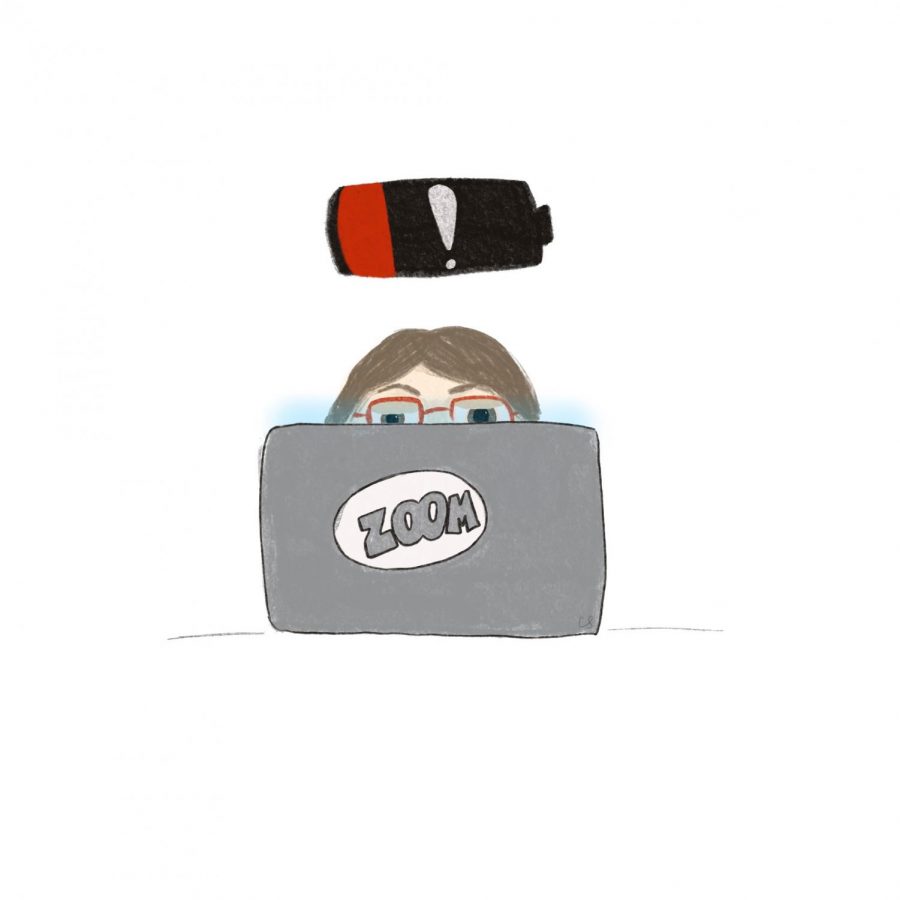Zoom Fatigue: The Reality of Online Classes
The numerous emotions surrounding Zoom
The abrupt arrival of Covid-19 has introduced millions of students to an online school system. With the consistent use of Zoom to virtually attend classes, students are left feeling a roller coaster of emotions. There’s no doubt that the consistent use of technology (especially zoom) can cause fatigue on a number of levels.
While Zoom has revolutionized online learning, the struggles and negative effects of being online all day persist. Since this is still a new reality that people are trying to cope with, there is a high level of anxiety surrounding it. Whether it’s stress from speaking in front of the class, having the video camera on, being put into breakout rooms, or even adjusting to the new technology, it is completely normal to feel overwhelmed. The general awkwardness of attending class from a personal space can cause a strain on students’ mental health. Though Zoom classes can be a nice excuse to stay in pajamas, it is simply not the same as sitting in a real classroom with peers. Sophomore Melissa Holland said, “Sometimes using Zoom for classes can be tiring because of how repetitive it can be. Especially on the days where I have no in-person classes and all zoom lectures, it can be mentally draining to sit through hours of it.”
Whether it’s the walk to class, the morning routine, or even having a physical classmate sitting close, these little things matter when it comes to having a successful learning experience. Sitting in the same environment for an extended period of time can cause both emotional and physical drainage. Staring at a screen for hours can be harmful to the eyes and can be especially exhausting when your Zoom classes are back to back. According to Dr. Nigar Kirmani, a professor of medicine at Washington University School of Medicine in Saint Louis , “people have to concentrate on pictures and videos and that can cause eye strain and headaches.”
Online learning may seem like a never-ending cycle of exhaustion, but there are some ways to help and to work through fatigue. When it comes to anxiety, everybody copes in their own way, but practicing general self-care can lessen the effects of burnout or fatigue. Working through breathing exercises to calm the nerves or even doing simple meditation can prevent anxiety from becoming unmanageable.
This same anxiety may also be present for situations like being placed into breakout rooms and speaking in front of the class. Zoom anxiety can cause feelings of embarrassment and the fear of being judged by peers. Oftentimes, this is not the case. It is normal to have anxiety about sharing input in group settings. While this feeling can be isolating, it is important to keep in mind that many other students are experiencing this as most universities are transitioning to hybrid and online learning.
Another common source of anxiety is having the camera on during a Zoom meeting or class. A study published in the “Behavior Research and Therapy” journal, shows that humans have the tendency to look at themselves in the camera rather than at the other people in the call. Sometimes consistently looking at oneself can increase anxiety levels and even distract from the task at hand. One tip to help prevent this is to change the layout of the Zoom meeting so you aren’t even able to see your screen. This can help avoid any urges to look at yourself and help you focus on the purpose of the meeting.
It is also easy to feel unmotivated to work as a result of the lack of a physical classroom. Replicating a “normal” school day is difficult when managing a back-to-back Zoom class schedule, but maintaining a daily routine at home is an important part in getting the most out of an online learning experience. Typical habits like setting an alarm, looking put-together, and eating and drinking often will provide a sense of normalcy. In between classes or meetings, it is important to take a break and stretch or take a walk. Maintaining self-care during an online-heavy school day can help lessen the effects of Zoom fatigue over time.
Your donation will support the student journalists of Saint Louis University.






